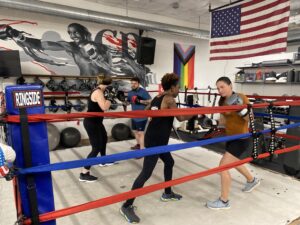-
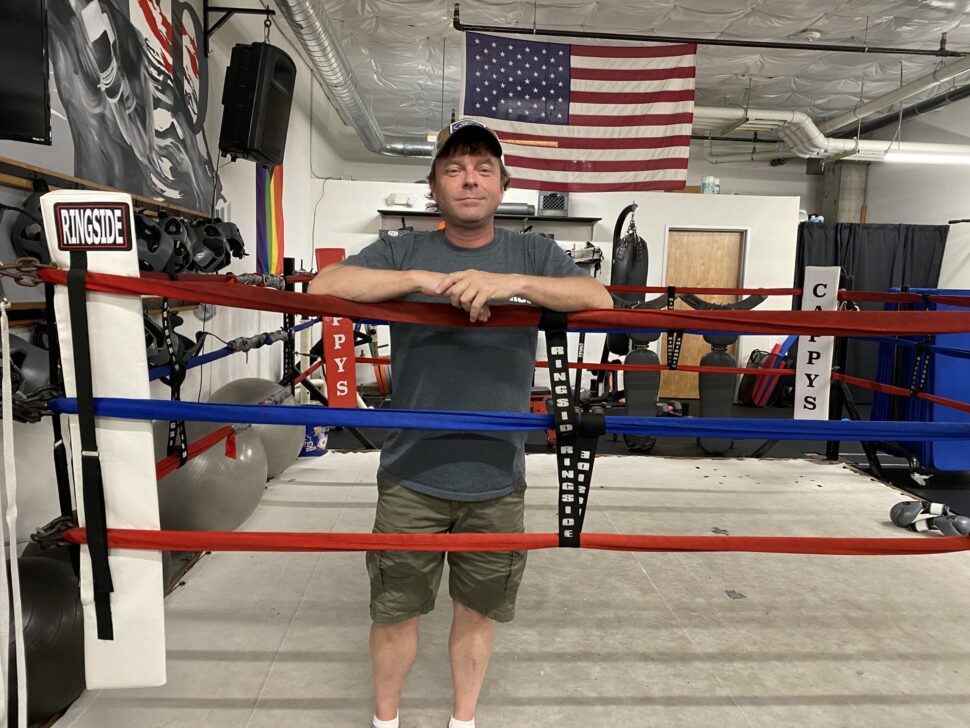
Lessons From Boxing: In Life And In The Ring
“Come to boxing and you’re going to learn about yourself…”
Boxing is often thought of as a fast-paced workout, but it can be more than just a way to work up a sweat.
Mike, the owner of Cappy’s Boxing Gym in Seattle says that the sport creates a healthy environment for cultivating self-awareness. He states, “I started boxing and very early on learned that it’s a safe space for self-awareness and self-development… I love the physicality of boxing and linking that physicality to life.”
Mike began boxing 18 years ago at Cappy’s and immediately fell in love with the sport. He then became a coach and eventually bought the gym.
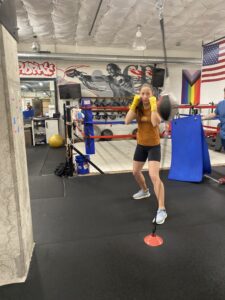 Learning through Movement
Learning through MovementBoxing involves working in sometimes intense and elevated situations such as being close to others during punching drills like mitwork.
When in close contact, emotions may become heightened and behavioral patterns can be revealed. This environment can illuminate fight, flight, or freeze responses.
Learning how to handle situations where you are scared or uncomfortable is one of the most empowering things a person can do.
It helps us recognize our patterns and reactions so that we can change them if needed in the future. This type of self-awareness also helps build confidence, making us feel better about ourselves and more confident when facing other difficulties in life.
Responding in the Moment
We all have challenges that we face, whether that be in the boxing ring against an opponent or within ourselves.
In these scenarios, it can be helpful to identify automatic reactions.
Mike explains, “When you’re typically in that heightened situation, you’re timid, you don’t like being there. A skilled opponent in boxing can pick that off easily because they can sense that. Do you stand with confidence and deal with the situation even when inside you’re going ‘oh my gosh get me out of here, this is not good’?”
Whether you’re dealing with a physical situation or emotional one, being able to respond in the moment is a skill.
Learning your patterns has power. If you can recognize your default response, you then have the ability to learn and change your reaction.
You can explore ways to improve your responses and make choices in the next situation that serve you better.
Mike elaborates, “In that heightened situation when shit hits the fan, then you learn, is that [automatic response] efficient? Does this work for you? What adjustments do you want to make to those defaults?”
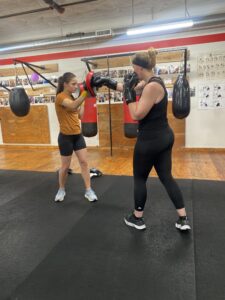 What to Expect
What to ExpectAll levels are welcome at Cappy’s boxing. Mike says, “Most boxers, when they start, are super nervous. It’s a heightened situation just walking downstairs into the gym. That’s super common. I appreciate that authenticity.”
Classes are group fitness based and follow a circuit training format. Boxers work on the fundamentals of boxing such as stance, cover, and punches.
Boxers are paired up and moved through different stations that last 2-3 minutes – the typical length of a boxing round. Each station has a different focus and drill.
Mike sets the scene, “You’ve got a coach telling you what you’re doing and what the drill is, then they’re letting you go and practice it. You might feel like you suck at it or like you’re a badass or somewhere in between.”
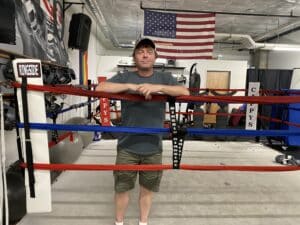
More Than a Workout
The overall feel of the class is energetic and lively. Everyone is working to the best of their ability, some are exhausted and taking a break while others are pushing through the entire workout.
Mike elaborates, “Everyone is doing it [boxing] at their own pace and we’re just guiding them along the way. The beginner level is basic body awareness and being able to understand, ‘Hey you’re gassing out. Let’s make some modifications. Let’s pace ourselves.’”
Mike believes in boxing, not only as a form of fitness, but as a form of self-discovery, confidence building, and connection.
Mike says, “We’re here to work out. We’re here to do what we can, at whatever level that is. We’re here to have a good time and interact with other people.”
Boxing is offered twice a month on Monday evenings. Register for the next class here.
0 -

After the Emerald Cup – Report From the Bodybuilding Stage
Report From the Stage
Recovery Beyond staff member, Jenn Boudreau, competed at the recent 40th Anniversary Emerald Cup Bodybuilding & Fitness Expo. Jenn, a seasoned bodybuilding competitor, was no stranger to the Emerald Cup.
After three thwarted attempts at joining the competition due to injury, pregnancy, and coaching, the 2017 Emerald Cup was previously her final appearance in the bodybuilding arena. “I’ve never put so much effort into anything in my life,” says Jenn, “Before, if I didn’t win my world was shattered. Now, my self worth is no longer tied to my placing.”
Bodybuilding helped Jenn maintain her substance use recovery. The gym was a space where she was surrounded by others who weren’t focused on drinking. “My first attempt at prep was my first attempt at sobriety as well,” she explains.
Growing Through the Years
Prior to taking the stage, the 2022 Emerald Cup proved different from previous years competitions.
As Jenn prepared to go before the judges, she noticed a shift in her mentality, “I think when I was younger, I was always fighting with my body and felt like I was trying to ‘punish’ it to get it to do what I wanted. This prep was more like coaxing it, and trusting that it was going to get there, even in the first few weeks of prep when I was still adding muscle so I didn’t see the scale move.”
This mindset translated to the competition stage. In previous years, Jenn struggled with the ever-changing standards of perfection. Bodybuilding judging is subjective. Competitors train to look a certain way, then might find the judges prefer a different body-type all together.
Striving for contrasting versions of the perfect physique took a toll on Jenn, “After so much internal turmoil of never being enough or never being good enough, and an injury, I put up my heels. Going on stage this time [in the 2022 Emerald Cup] I was in love with my body, I didn’t care how I measured up against the other girls, and I didn’t see one person who made me feel like I wasn’t good enough. I felt this not because everybody else wasn’t competitive or in shape, I just really liked my body and it had come through for me exactly on time, performed exactly how I needed it to and I was grateful for it.”
Overlap of Recovery and Training
Recovery Beyond is proud of the determination, commitment, and intention Jenn puts into all areas of her life. T
here are parallels between recovery from substance use disorders (SUDs) and training for a fitness event; it takes time, it can be painful, and it can be hard to trust the process.
Jenn explains, “Recovery from SUD requires that you do things that are uncomfortable, you have to force yourself to do things when you don’t feel like doing them and when it might even hurt to do them. Fitness, training for something in particular, is very good practice for the things you need to do to recover. You have to follow a workout plan/treatment plan. It hurts sometimes in the beginning (early sobriety is often painful) and you are sore and tired afterwards (completing the 12 steps or talking with a peer support counselor can have a similar effect emotionally you feel raw and exhausted).
The biggest difference is that fitness has tangible, measurable and visible results. You can see the transformation occurring and you get stronger and daily activities become easier.
When you realize that you can push through the pain, and the results are beyond what you ever thought you could obtain, a confidence and sense of pride or accomplishment develops. This often translates into other walks of life.
It’s easier for someone who has trained 16 weeks for something and knows that the results at the end of it are phenomenal, to push through the pain of recovery steps, where often there are no visible results, and trust that at the end of 16 weeks they will have accomplished something worth the pain.”
-

Recovery Beyond Sponsors Bodybuilding Competitor
Recovery Beyond, a local non-profit that facilitates healthy lifestyle and social support activities for people in recovery, is proud to sponsor Jenn Boudreau at the 40th Anniversary Emerald Cup Bodybuilding & Fitness Expo from April 29th-30th. Jenn, a seasoned bodybuilding competitor, is no stranger to the Emerald Cup. After three thwarted attempts at joining the competition due to injury, pregnancy, and coaching, the 2017 Emerald Cup was her final appearance in the bodybuilding arena. Now, she’s coming back to the same stage to revisit a goal she set for herself many years ago. “I’ve never put so much effort into anything in my life,” says Jenn, Recovery Beyond staff member and bodybuilding competitor. “Before, if I didn’t win my world was shattered. Now, my self worth is no longer tied to my placing.”
Bodybuilding helped Jenn maintain her substance use recovery. The gym was a space where she was surrounded by others who weren’t focused on drinking. “My first attempt at prep was my first attempt at sobriety as well,” she explains. “If I had had this group [Recovery Beyond] at the last Emerald Cup I probably would have won. I took second place in two divisions [at the 2017 Emerald Cup] and not because I didn’t have the physique but because I couldn’t stop drinking during that prep. I’m positive if I had not been drinking at all in that prep, I probably would’ve won…I’m coming back knowing that [drinking] won’t be the thing that stops me.”
Jenn recalls conversations she had with fellow competitors while working a Recovery Beyond booth at a bodybuilding event earlier this year. “[They] secretly wanted to make sure no one was listening to us and whispered, ‘I’m in recovery too.’ I told them literally every single person who has come to the booth has said that to us. They were baffled. They were falling over like, ‘What really? There are other people who like bodybuilding who are in recovery as well?’ They couldn’t believe it. It was great to be able to bring it to the competitors’ attention that most of them were in recovery.”
Recovery Beyond hopes that sponsoring Jenn will create awareness of substance use disorder and spread the word that there is a recovery community that enjoys fitness and healthy lifestyle activities as a pathway for recovery. Megan Fisher, the new Executive Director for Recovery Beyond, a person in long-term recovery, and an advocate for stigma reduction, shares what fitness did for her recovery. “I was close to two years abstinent from alcohol, but couldn’t put down the cigarettes. I got involved in a running group through my church and ended up slowly training for the Chicago Marathon. Every day, as I worked through my run/walk cycle, I reminded myself that a cigarette would destroy my goal. The community of supportive friends who had a common purpose drove me to keep showing up. I ran that marathon, I’m 14 years sober, and I’ve been smoke-free ever since!”

